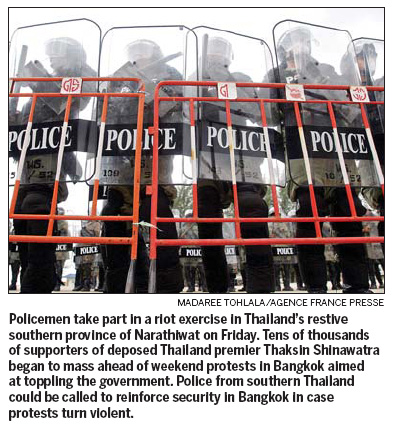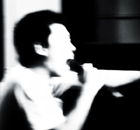Asia-Pacific
Protesters start bid to topple govt in Thailand
By Ambika Ahuja (China Daily/Agencies)
Updated: 2010-03-13 08:05
 |
Large Medium Small |

BANGKOK - Anti government protesters began gathering on Friday for what they promise will be a "million-man march" in coming days to paralyze Thailand's capital and force the government to call elections.
About 40,000 soldiers and police fanned out across the city as several thousand red-shirted supporters of deposed premier Thaksin Shinawatra began gathering in one of the biggest challenges yet to Prime Minister Abhisit Vejjajiva.
But the political turbulence has failed to shatter confidence in Thailand's financial markets. Many investors and political analysts doubt even violent protests will derail the government, which is backed by the military's top brass and the urban elite.
In five major areas of Bangkok, protesters gathered under searing afternoon sun to listen to speeches by leaders of their movement, the United Front For Democracy Against Dictatorship (UDD), standing on trucks-turned-makeshift stages. "We are calling for the return of power to the people. Let them decide the fate of this country," one "red shirt" leader, Veera Muksikapong, said.
Economists caution that possible unrest could hurt some businesses and sap consumer confidence in Southeast Asia's second-biggest economy, possibly forcing the central bank to delay an expected rise in interest rates from record lows.
But most expect the rising trend in Thai stocks, among the cheapest in Asia, to remain intact, noting that "red shirt" protests last April that sparked Thailand's worse political violence in 17 years failed to unseat the government.
Foreign investors are more focused on a swift, export-led economic rebound in Southeast Asia's emerging markets, and have snapped up about $500 million of Thai stocks since January, with most of the buying in recent weeks.
Intractable crisis
The protesters will regroup on Sunday with the "red shirts" vowing to bring hundreds of thousands from the provinces into Bangkok's streets at a scale almost unprecedented in recent years. Organizers say the rally will last at least seven days.
Many businesses and schools were shut in the capital while some companies allowed staff to work from home.
Armed guards stood at many banks and state buildings after warnings of potential sabotage, including bombings.
The protests add a new strain to a seemingly intractable political conflict pitting the military, the urban elite and royalists, who wear the revered king's traditional color of yellow at protests, against the mainly rural supporters of Thaksin, who say they are disenfranchised and wear red.










